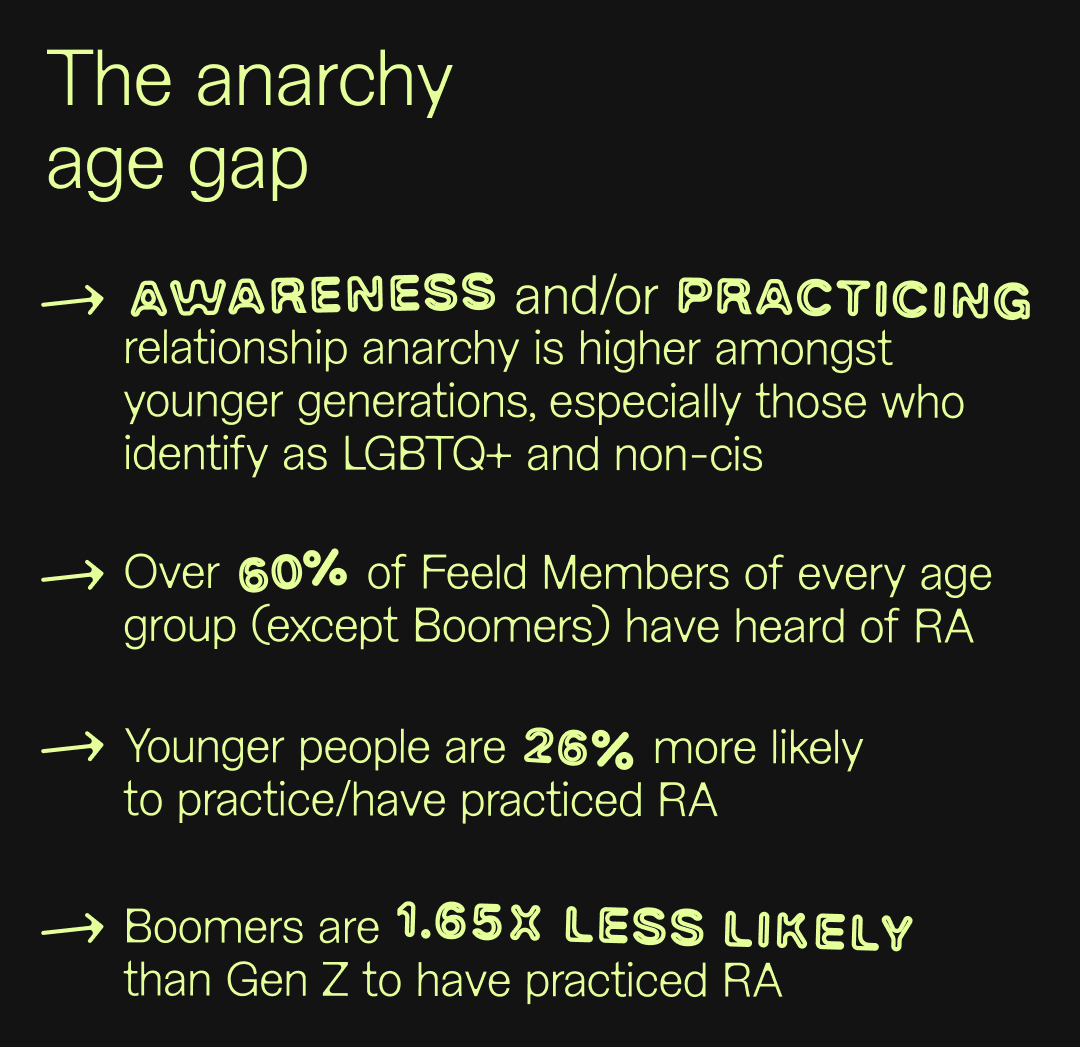
State of Dating Volume III: Relearning Love
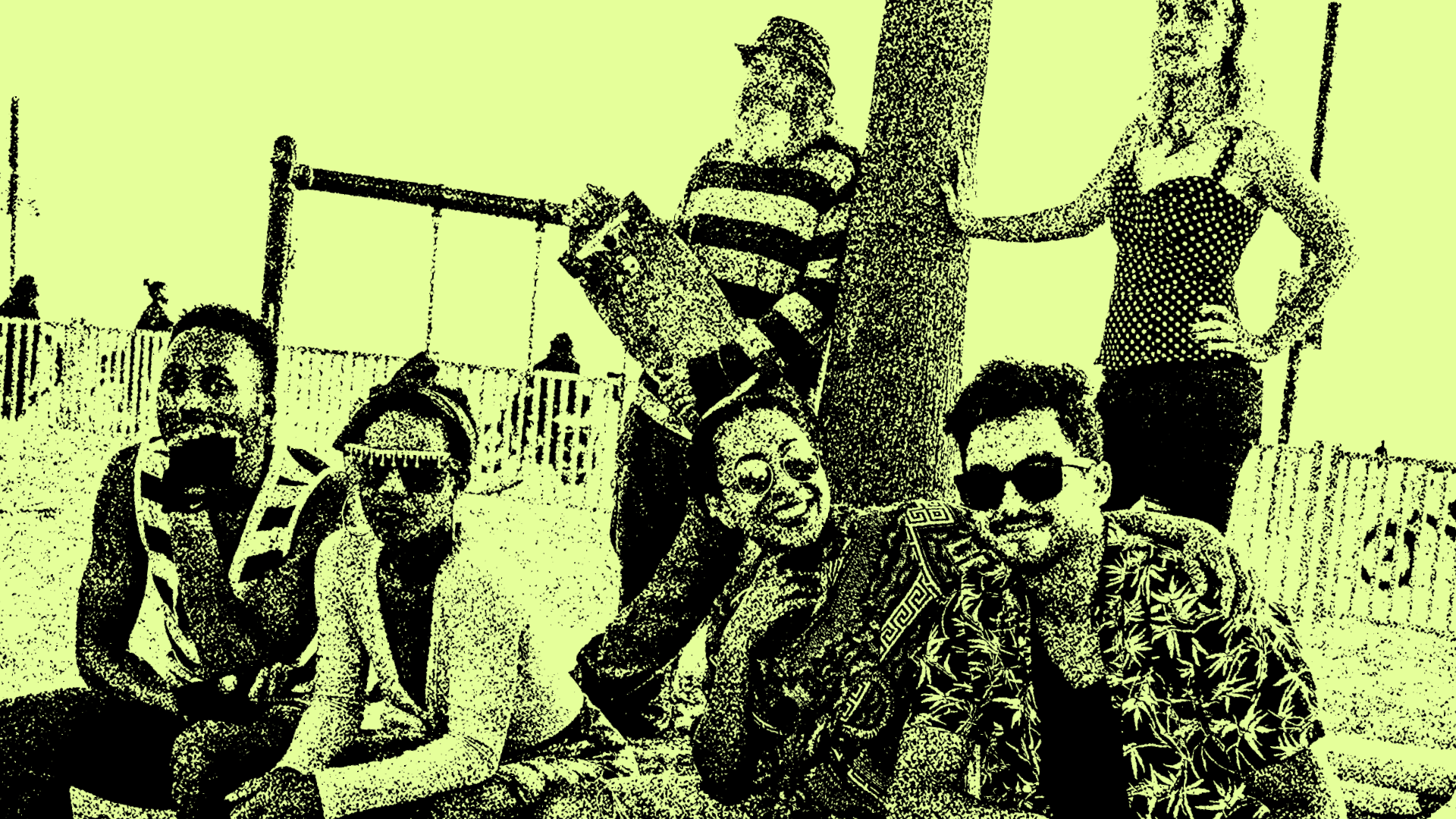
No gods, no masters, no lover above another.
Relationship Anarchists are practicing a new, radical intimacy. In the latest volume of State of Dating, we dive into why Relationship Anarchy is fast gaining traction.
Why do we stratify our personal relationships? Why does the class system of our personal lives look like a hierarchy of romantic relationships, family, friends, then everyone else? It’s all the more perplexing within the context of the loneliness epidemic (now endemic). The disintegration of our communities has put an unthinkable amount of pressure on romantic relationships to meet all of our emotional needs—an unsustainable prospect at best.
The writing on the wall is clear: the old world is dying, the new world is joyfully being born, and it looks like Relationship Anarchy.
In the third volume of State of Dating, expert Ruby Rare examines the growing community of Relationship Anarchists: those who believe in an egalitarian version of love. Do you believe another world is possible? Read on to catch a glimpse of it.
Loneliness
The 2024 State of Dating report by Feeld and Kinsey Fellow, Dr Justin Lehmiller, gave us a foundational understanding for why Gen Z is experiencing less connection. Factors like less sex, fewer partners, and fewer relationships than previous generations paint a full picture. Gen Z may be the loneliest generation, with recent surveys showing 73% often feel alone and disconnected—but this impacts people of all ages. The UK government has appointed an official minister tackling loneliness, recognizing it as a growing public health concern, and it was the focus of Feeld’s panel Fighting Loneliness in Our Digital World at this year's SXSW festival.
Surrounded by growing political turbulence and an increasingly online and fragmented society, seeking happiness and connection is a tall order. How might our relationships be impacted by this, and can we find solace in them?
In this report, we examine how a broader variety of relationships impact experiences of loneliness, identifying Relationship Anarchy (RA) (when practised openly and honestly) as an unexpected “hero” antidote.
ENM walked so RA could run
Before RA, Ethical Non-Manogamy (ENM) has been an alternative avenue for emotional intimacy. One in five people surveyed in the US and Canada have experience with non-monogamy. In the UK, a third of heterosexual men were open to having more than one spouse or long-term partner, along with 11% of women. This aligns with the steady growth in Feeld Members—on average 50% year-over-year—and the rise in resources around ENM.
ENM's embodiment of less-conventional relationships offers many people avenues out of loneliness, with RA forging an even clearer path.
Monogamy has historically been the default and compulsory relationship style, with the underlying message to “funnel all our needs exclusively through one romantic relationship,” as Lola Phoenix, author of The Anxious Person’s Guide to Non-Monogamy, puts it.
And there’s a feeling that the amount of love we can offer is capped, also known as the scarcity model. This economic concept has crossed over and fully ensconced itself in our romantic lives. And yet, the ways we exercise multiple loves in platonic and familial areas of life show us that loving multiple people at once–-and fully—is not only possible, but we are likely already doing this in joyful and enriching ways. Once we stop viewing love and intimacy as finite resources, it can radically shift our worldview and attitudes in relationships, and beyond.
Relationship anarchy
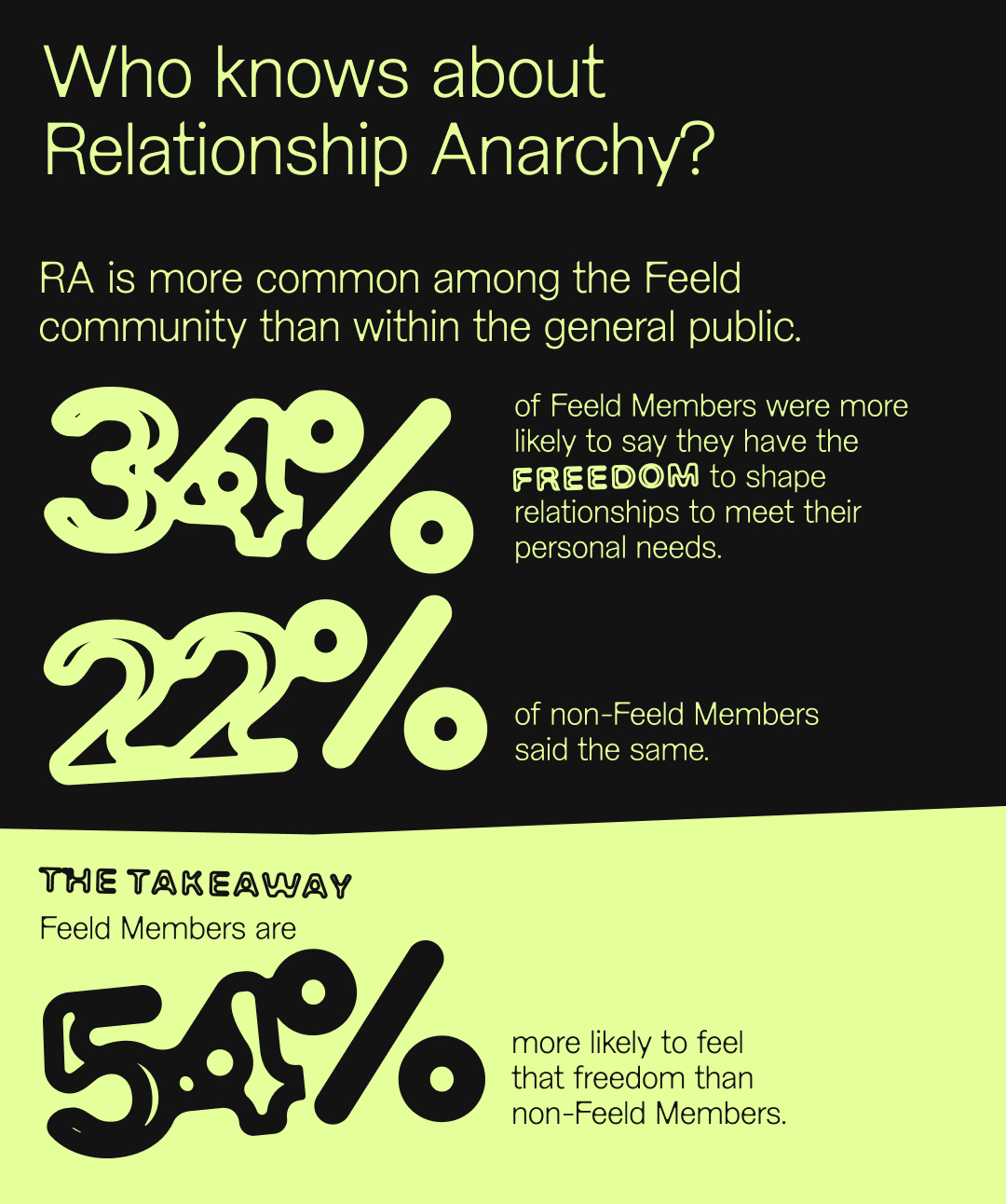
While ENM offers various takes on building connections, relationship anarchy stands out as particularly unique. It’s a relationship style coined by writer and activist Andie Nordgren (though RA has roots in many different histories and cultures), and follows politically anarchic principles of anti-capitalism and anti-hierarchy.
The key concept is that no relationship should be bound by any rules not entirely agreed upon by the involved parties. RAs regard all of their personal relationships “as equally important, unique, fulfilling different needs or desires in their life, and as possessing similar or identical potential for emotional/physical/mental intimacy, love, and satisfaction.” Through my personal experiences, I’ve learnt RA prioritizes community, mutual care, and the cultivation of diverse, meaningful relationships—not just those centered around romance or sex.
The reason RA hasn’t gained wider cultural traction likely has less to do with its relevance or impact, and more to do with how deeply many of us are still tethered to traditional models of connection, often without pausing to consider what truly meets our emotional and relational needs. There can be a misconception that an “anarchic” approach means avoiding responsibility or accountability. While some people may interpret RA this way, this doesn't reflect the true spirit of the practice, and can lead to damaging misunderstandings about its philosophy.
Although the term “relationship anarchy” remains relatively niche, it raises a compelling question: could this framework help reimagine how we all approach connection—regardless of whether we identify as monogamous, non-monogamous, or somewhere in between? RA moves beyond debates about romantic and sexual exclusivity and invites a broader conversation about care, autonomy, and emotional intention. So, how familiar are people with this concept? Who’s engaging with it, and in what ways is it influencing their relationships, their emotional well-being, and how they move through the world?
Key findings
1. Relationship Anarchy: More popular than you think
Surprisingly, many people are practicing relationship anarchy without necessarily knowing it. Relationship structures are changing, with both Feeld Members and others globally experiencing more variety in their relationships than anticipated.
While the principles of RA are becoming better known, the terminology still appears to primarily exist in spaces with a focus on less-normative exploration. After sharing the definition of RA, our survey found that 1 in 5 non-Feeld Members have practiced a relationship style that fits within the RA definition.
There’s a significant increase in this when we look at Feeld Members where 1 in 2 Members surveyed realized they have practiced relationship anarchy.
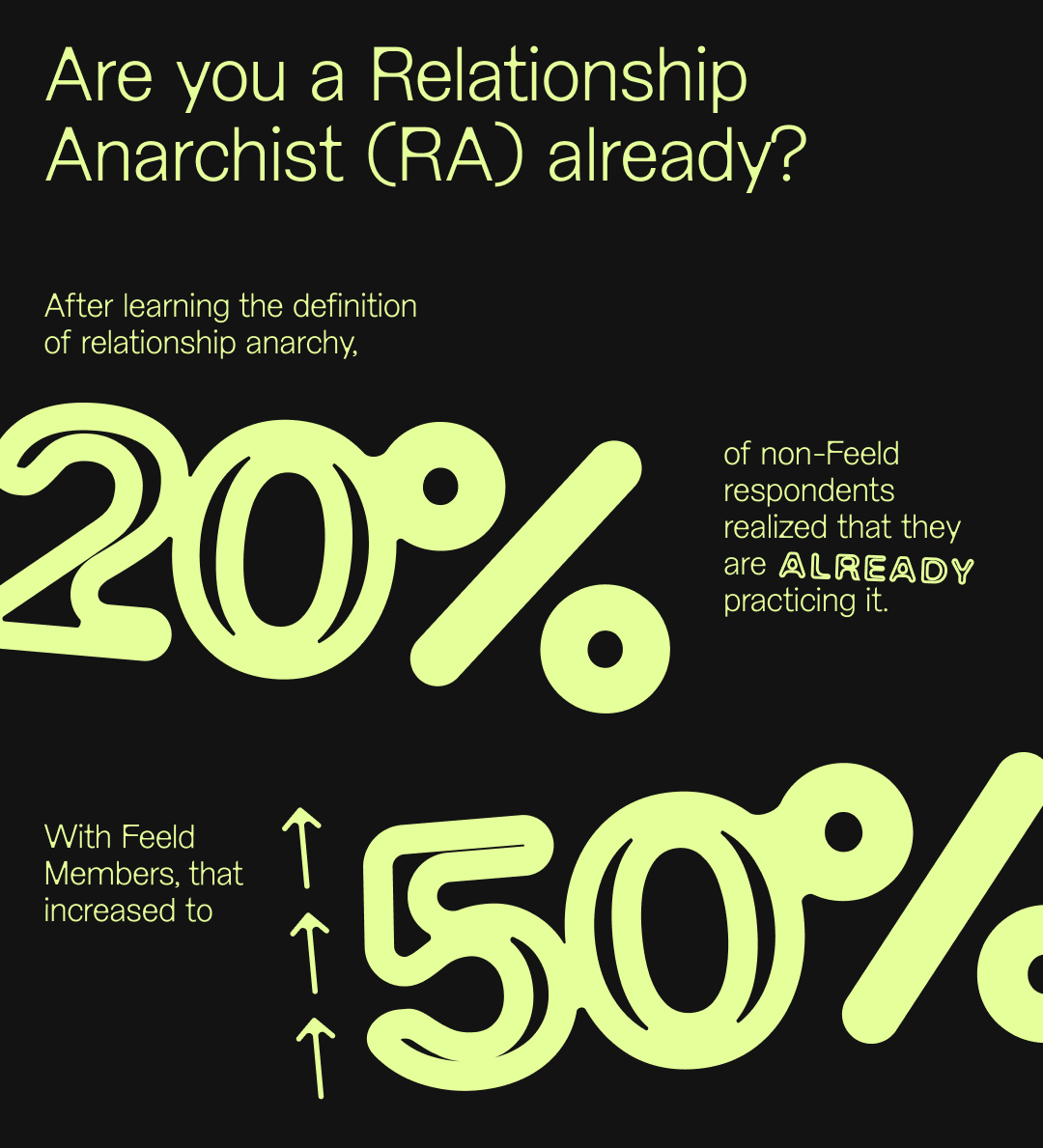
Unsurprisingly, Feeld Members of all demographics were more likely to have an existing awareness of RA compared to non-Feeld users—64% compared to 18% of external non-Feeld Members. It’s likely that those drawn to Feeld may already have some knowledge about non-normative practices. Alternatively, in using the app, they’ve become better equipped to explore a broader range of relationship structures.
Awareness and/or practising of RA is highest amongst people in younger demographics, who identify as LGBTQIA+ and non-cis, and have experience with ENM. In short, the less cis- and heteronormative your sexuality, the more likely you are to practice relationship anarchy.
- Surveyed trans, non-binary, and gender diverse people (Censuswide survey) are up to 2x more likely to have practiced relationship anarchy than cis men and cis women.
- Pansexual Members on Feeld are most likely to be a relationship anarchist—1.4x more likely than all other sexualities.
- Those who identify as asexual (Censuswide survey) are most likely to be a relationship anarchist—1.6x more likely than all other sexualities.
Dr Y. Gávriel Anasara notes RA’s potential “to subvert the social hierarchies that devalue aro[mantic] and ace spectrum people’s interpersonal attachments,” positioning RA in contrast to many other forms of ENM, where there’s still a heavy emphasis on romance and sex. RA’s non-hierarchical approach to all relationships may explain the appeal to asexual and aromantic people. Millennials and Gen Zers are 1.5x more likely to know about RA than Boomers. Of note, only 15% of Boomers surveyed have tried relationship anarchy. While no generation is a monolith, Feeld’s first State of Dating Report revealed that, although monogamy remains a popular fantasy among Gen Z, there’s also a growing awareness and exploration of sexuality, gender identity, and kink. RA data reinforces this trend, showing that younger generations are increasingly engaging with non-traditional ways of relating and being.
2. Perception vs reality
Relationship anarchy is wildly misunderstood. There’s a disconnect between the experiences of those practicing RA and the assumptions of them from more skeptical outsiders. The biggest misconception is that one needs to be detached in some way to succeed—when, according to relationship anarchists surveyed, it actually requires:
- Self awareness: mentioned over twice as often (212% more frequently) among people who have practiced RA vs. those who have not
- Boundaries: +25% mention rate amongst people who have practiced RA vs. those who have not
- Maturity: +45% mention rate amongst those who have practiced RA vs. those who have not
- Empathy: +112% mention rate amongst people who have practiced RA vs. those who have not
- Honesty: +112% mention rate amongst people who have practiced RA vs. those who have not
- Respect: +49% mention rate amongst people who have practiced RA vs. those who have not
Unsurprisingly, the tone of responses was directly correlated to participants’ ages, with Boomers framing RA in terms of individualism and personal freedom, while Gen Z leaned more toward themes of collectivism, interdependence, and mutual support.
There’s a stronger sense in Boomers’ responses that people are either inherently suited for non-conventional relationships, or they’re not, with words like “confidence,” “conviction,” and “integrity” appearing frequently. In contrast, Gen Z tends to view emotional and relational skills as something that can be developed over time—“reflection,” “knowledge,” “maturity”—highlighting a shift toward a continuous, non-linear process of learning and growth.
And the biggest challenge reported by relationship anarchists? Negotiating relationship boundaries, which RA Feeld Members find a staggering 536% more challenging to do than non-RA Feeld Members, who were 46% more likely to find it easy to negotiate relationship boundaries than a relationship anarchist.
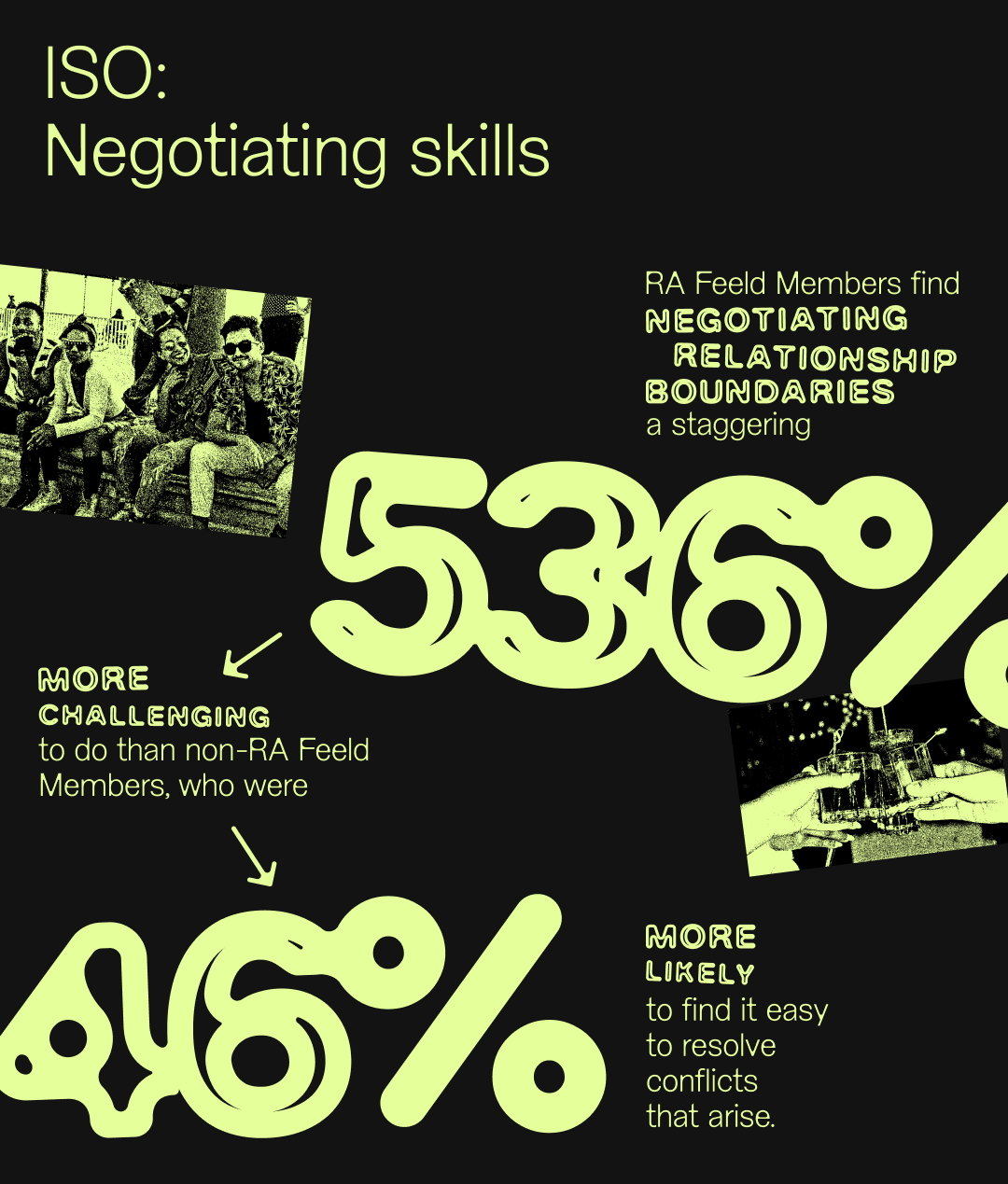
There are at least two possible explanations for this. One is that the more you stray from the traditional path of monogamy, the less of a roadmap or script you have to follow. At the same time, RA may attract—or cultivate—a heightened level of self-awareness compared to the general population, making people more likely to self-report the emotional labor in negotiating constructing boundaries. When you’re opening things up in RA, you’re creating an environment with more variables, essentially building connections from the ground up in ways that are tailored to your personal needs. So, it’s understandable that that level of intentionality comes with more challenges in creating, negotiating, and refining your boundaries.
These findings reflect the key principles of The Non-Monogamy Playbook, that in nontraditional relationships it’s essential to be willing to experiment, challenge conventional thinking, and sometimes get things wrong.
As much as RA offers immense possibility and deep rewards, the path isn’t without its share of complexity. According to our external survey data, those who practice RA feel more pressure than non-RAs. They are:
- 96% more likely to have experienced negative reactions from prioritizing seeing multiple partners over focusing on one partner (romantic and/or sexual)
- 56% more likely to have experienced negative reactions from prioritizing a friendship over a romantic partner AND have had 62% more negative reactions to prioritizing a friendship over family
- 43% more likely to have experienced negative reactions to prioritizing a romantic partner over family
- And, alternatively, 39% more likely to have experienced negative reactions to prioritizing family over a romantic partner
- 44% more likely to feel pressure to prioritize romantic relationships
Relationship anarchists experience more external judgment when their relational priorities challenge conventional romantic norms. However, those who practice RA perceive that they have a more reliable support network, and feel safer to express their thoughts and feelings in their relationships.
Regardless of their relationship structure, all surveyed respondents strongly agreed with the statement: "I experience less loneliness when my relationships meet my emotional needs."
3. Relationship anarchy: The antidote to loneliness?
We need to build the emotional skills to sit with discomfort—in our relationships and in our experiences with loneliness. Could relationship anarchy or other non-conventional ways of relating offer a meaningful entry point for that growth? In short: yes.
Relationship anarchists on Feeld and off report more freedom, less loneliness, and are more likely to value connections that are deep and broad. Compared to non-RA practitioners surveyed, relationship anarchists are:
- 1.5x more likely to say having a diverse range of connections helps with loneliness
- 31% more likely than non-RAs to report feeling like they can shape their relationships to meet their personal needs
- 20% more likely than non-RAs to report having a reliable support network
Relationship anarchists are also 27% more likely to value small, deep connections for reducing loneliness, and 28% more likely to see dating apps as spaces for friendship and community, not just romance and sex. These insights suggest that a variety of different types of relationships in our lives provides a greater sense of connection and community.
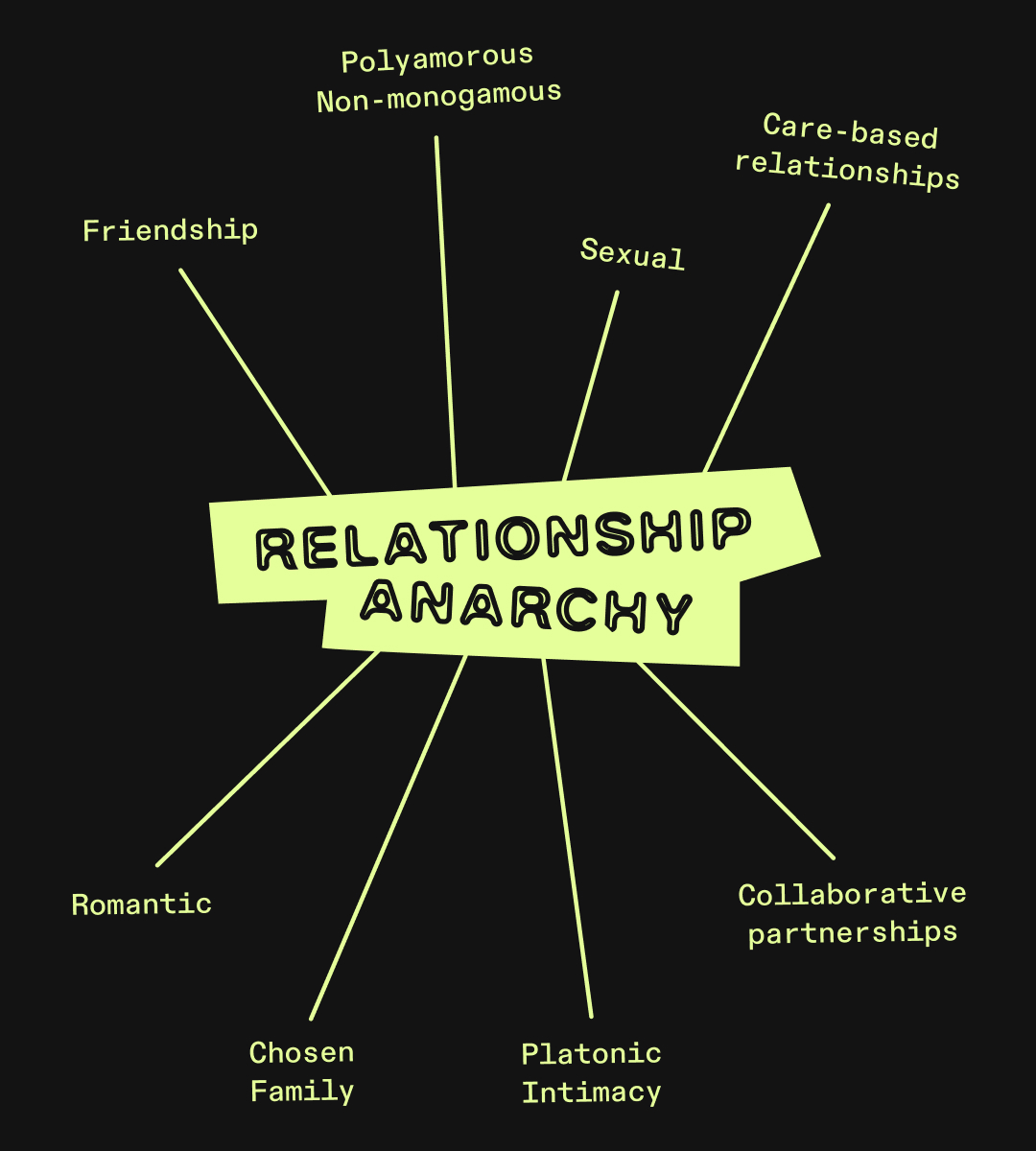
RA is one of several possible avenues to develop emotional depth and resilience, and broaden your community: there’s no-one-size-fits-all approach here. But it’s arguably one of the more fun ways to grow your support network, with a great deal of potential for joy and pleasure (if this wasn’t so professional, I’d add a winky face).
Conclusions
So, what happens when we start questioning the "default settings" of how relationships should look? For folks who practice relationship anarchy, the answers are pretty powerful. Many relationship anarchists report feeling less lonely, not more. They experience a stronger, more dependable support network and an increased ability to share their thoughts and emotions openly, without feeling like they have to filter or perform for a specific relationship role.
Tackling loneliness, or having a more honest relationship with it, requires independence and interdependence. Inhibiting the breadth of connections we can create and feel doesn’t serve us in a world where so many people feel isolated. RA invites us to take a long, honest look at the default hierarchy placed on relationships.
By learning more about the principles of RA, there is an opportunity to experience intimacy and meaningful connection through a wider exploratory lens. Relationship anarchy encourages us to reimagine where intimacy lives: not just in the arms of a partner, but in late-night chats with a best friend, in chosen family, in creative collaborations, and in community care.
There are so many ways in which support systems can be built and nurtured. This perspective doesn't just challenge loneliness—it transforms it into an opportunity to build more authentic, affirming, and resilient relationships.
In what ways are dating apps responsible for amplifying loneliness? Or, in using them intentionally, how can they bridge gaps and help us connect with and build a broader support system?
Feeld CEO, Ana Kirova, has previously commented on modern dating feeling like a race: “This destination mindset can lead to frustration—people overlook the beauty of a connection, the new perspectives it can show and the things they could learn about themselves through others.” Cheesy as it sounds, it's about appreciating the journey more than being laser focused on the destination. RA gives people radical permission to rethink what relationship “destinations” even are–ditching traditional scripts in favor of writing their own personal definitions of love, connection, and commitment.
So maybe the real question isn’t “how do we fix loneliness?,” maybe it’s “how can we make more room for love in all its amazing, unexpected forms?”
Because throughout the turbulence of new tech and disconnection, and the limits of traditional relationship structures, love persists. This is a call to care more about the intimacy in our lives, how we can nurture and transform it.
Our findings indicate that, for many, the principles of relationship anarchy aren’t as unknown as they may seem—with the younger generations and queer communities leading the way. In fact, they often echo the quiet truths people already feel about love, care, and connection.
It’s time to bring relationship anarchy out of the shadows, and into the spotlight. It’s got the potential to transform all of our lives, even if we don’t know it.
Survey rationale and goals
We set out to explore how sexual and relationship identities, behaviors, and preferences differ between Feeld Members across generations, using a blend of proprietary data and external survey responses.
By examining these generational contrasts, we uncovered how ideas around connection and desire are evolving over time. This analysis sheds light on the rich diversity of people's experiences and offers fresh insights into how people choose to define and express their sexuality and relationships.
Methodology
In February 2025, the Feeld team invited Members to complete a brief survey on relationship anarchy. It was also shared with non-Feeld users via third-party research agency Censuswide and through author Ruby Rare’s social media.
A total of 9,026 people responded: 3,023 Feeld Members and 6,003 external participants. Respondents came from 23 countries, primarily the United States (76%), United Kingdom (18%), Australia (4%), and Spain (3%).
The survey explored experiences of relationship anarchy, the connection between loneliness and relationship structures, and aspects of identity.
References
Ansara, Y Gávriel. Getting Real About Monogamism: Disrupting Mononormative Bias in Sex Therapy and Relationship Counselling. P.10. Neves, Silva and Davies, Dominic (eds). Relationally Queer: A Pink Therapy Guide for Practitioners. Routledge, 2023.
Dador, Denise. Gen Z is the Loneliest Generation, as Young People Yearn for More Meaningful Friendships, Experts Say. ABC News, 2024.
Feeld & Lehmiller, J. J. The State of Dating Report: How Gen Z is Redefining Sexuality and Relationships. 2024.
Green, DK. Common Presenting Issues in Consensual Non-Monogamy. P. 43. Neves, Silva and Davies, Dominic (eds). Relationally Queer: A Pink Therapy Guide for Practitioners. Routledge, 2023.
Haupert, M. L., Gesselman, A. N., Moors, A. C., Fisher, H. E., & Garcia, J. R. Prevalence of Experiences With Consensual Nonmonogamous Relationships: Findings From Two National Samples of Single Americans. Journal of Sex & Marital Therapy, 43(5), 424–440. 2016. https://doi.org/10.1080/0092623X.2016.1178675
Nordgren, Andie. The Short Instructional Manifesto for Relationship Anarchy. 2006.
Phoenix, Lola. The Anxious Person’s Guide to Non-Monogamy: Your Guide to Open Relationships, Polyamory and Letting Go. Jessica Kingsley Publishers, 2022.
Rare, Ruby. The Non-Monogamy Playbook: Exploring Polyamory and Open Relationships with Confidence. Ebury, 2025.
SxSW. Fighting Loneliness in Our Digital World, 2025. https://www.youtube.com/watch?v=f1_6R2rCUFY
https://www.therelationshipanarchist.com/
Thomas, A.G., Harrison, S., Mogilski, J.K. et al. Polygamous Interest in a Mononormative Nation: The Roles of Sex and Sociosexuality in Polygamous Interest in a Heterosexual Sample from the UK. Arch Sex Behav 53, 611–627. 2024. https://doi.org/10.1007/s10508-023-02749-6
Travers, Mark. A Psychologist Explains Love’s ‘Scarcity Principle’. Forbes, 2024.
Related Articles

